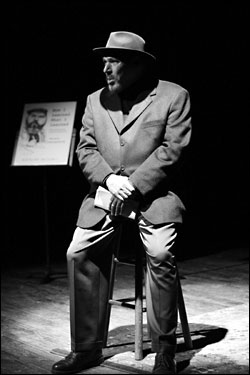HOW I LEARNED WHAT I LEARNED Seattle Repertory Theatre, Seattle Center, 206-443-2222. $10-$30. Opens Thurs., May 22. 7:30 p.m. Thurs.-Sun. and Mon., June 2. Ends Mon., June 2.
August Wilson can talk. What may be most striking about his debut solo project is how anyone ever kept the Pulitzer- winning playwrightwhose voluble, visionary works regularly run three hoursdown to just 90 minutes of monologue. How I Learned is an evening with an artist who could clearly gab all night; whether it’s actually an evening of theater is another matter.
Any encounter with Wilson’s complex, uncompromising pride will give you something to remember. He’s got a shirt on that reads “I am supposed to be white” and begins the night with the deadpan observation that when Abraham Lincoln “freed the slaves, he took our jobsand it’s been hell ever since.” What follows are the fitful, sometimes overly familiar recollections of Wilson’s maturation in a hostile world and his determined mission of “becoming and defining what it means to be an American.”
Director Todd Kreilder’s presentation feels a bit slapdash here, as does Wilson’s rambling assortment of beguiling tangents, a body of sometimes engaging reflections without much connective tissue. It’s a personable ramble, certainlyto hear Wilson, in his husky, emphatic half-whisper, elegantly compare an audience of enraptured Coltrane fans to a church congregation is to understand his famously regal empathy for everyman. Unlike his award-winning plays, however, these stories don’t collectively result in any grander finish.
Most unfortunateand this is certainly not Wilson’s faultis that attendance also guarantees you company with a mostly white Seattle audience “Hmmm!”-ing in ersatz recognition, ironically embodying the kind of self-congratulatory, I-don’t-see-color hypocrites that Wilson spends much of the show scolding. STEVE WIECKING
THE SEAGULL Theater Schmeater, 1500 Summit Ave., 206-325-6500. $12-$15. Pay-what-you-can every Thurs. 8 p.m. Thurs.-Sat.; 2 p.m. matinees select Sun. Ends Sat., June 21.
Everybody says that The Seagull is a comedy, and writer/director Wayne Rawley (Money & Run) is out to prove them right. He sets Chekhov’s 1895 play squarely in the present, dumps Moscow for L.A., peppers the dialogue with lots of pop-cultural references, and makes Masha a goth girl.
The production is mostly a success, though Rawley’s piece is often a weak corollary to Chekhov rather than a whole thing in itself. There’s something timid and unconvincing about the first hour or so, maybe because the contemporary references seem half-hearted, or maybe because the actors appear to be stuck somewhere between 1895 and 2001, unsure where to set their feet. But the play eventually tips from humor into full-out heartbreak, and the actors, apparently relieved to find themselves on firm dramatic territory, really loosen up and deliver a few gorgeous performances. The best of the lot is newbie Betsy Morris, who gets stuck with saying, “I’m the seagull,” and invests that oft-quoted, silly phrase with conviction and insight.
As for making the play funny . . . well, it’s still a downerRawley only proves that if you add a couple of Kangaroo Jack jokes, you’re still dealing with a play about burned-out, desperate people who search in vain for passion and meaning in their lives. Not exactly a hoot. CHRIS JENSEN
42ND STREET The 5th Avenue Theatre, 1308 Fifth Ave., 206-292-ARTS. $15-$60. 7:30 p.m. Sun. and Tues.-Wed.; 8 p.m. Thurs.-Sat.; 2 p.m. matinees Sat.-Sun. Ends Sun. June 8.
42nd Street is brought to the 5th Avenue Theatre by the touring company of the 2001 revival of the original lavish 1980 Broadway production based on the 1933 Warner Bros. musical inspired by an earlier film and novel. What’s really impressive is how fresh this archetypal backstage saga still feels even after this multiple processing. This isn’t a pastiche of ’30s musicals (i.e., the Gershwin resurrection Crazy for You), but a good, honest period piece.
Blair Ross is Dorothy, the leading lady who breaks her ankle, clearing the way for ingenue Peggy (Catherine Wreford) to be plucked from the chorus line and thrust into stardom. Ross gives a ferocious performance, so stylized and precise as to be almost balletic, yet vulnerable, emotional, and broadly comic. It’s too nuanced to be over the top; it’s poised exquisitely right at the top. The zippy Wreford is a sly bit of casting: She looks a lot like Ross, hinting at what their characters have in common. There’s already a little jaded diva in the rookie chorine and vice versa.
The show is stuffed with take-no- prisoners tap numbers set to classic Harry Warren/Al Dubin tunes, yet the startling, abrupt end of Act I is an imaginative coup de th颴re as gasp- inducing as the splashiest of them. 42nd Street has glitz to spare, plus enough savvy to know that glitz alone isn’t enough. GAVIN BORCHERT




